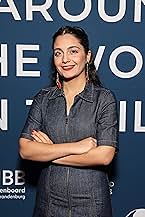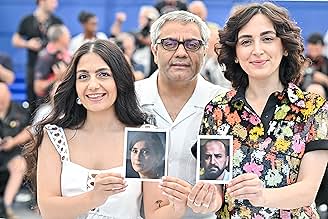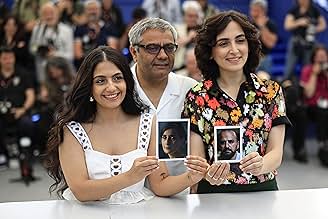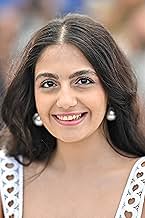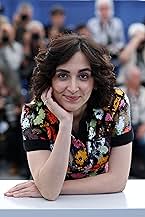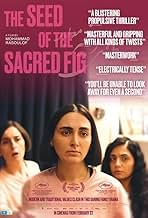Le juge d'instruction Iman est aux prises avec la paranoïa au milieu des troubles politiques à Téhéran. Lorsque son arme disparaît, il soupçonne sa femme et ses filles, imposant des mesures ... Tout lireLe juge d'instruction Iman est aux prises avec la paranoïa au milieu des troubles politiques à Téhéran. Lorsque son arme disparaît, il soupçonne sa femme et ses filles, imposant des mesures draconiennes .Le juge d'instruction Iman est aux prises avec la paranoïa au milieu des troubles politiques à Téhéran. Lorsque son arme disparaît, il soupçonne sa femme et ses filles, imposant des mesures draconiennes .
- Réalisation
- Scénario
- Casting principal
- Nommé pour 1 Oscar
- 36 victoires et 71 nominations au total
Avis à la une
To better understand the concept behind the film, this might help, learn where the name of the film comes from:
There are plants known as "strangler figs" that exhibit strange behavior. Strangler figs (genus *Ficus*) begin their life as seeds deposited on the branches of a host tree, typically by birds or other animals. The seeds germinate and send down roots that eventually reach the ground. As the roots grow and thicken, they encircle the host tree, creating a lattice-like structure.
Over time, the strangler fig's roots and branches grow larger and more robust, competing with the host tree for sunlight and nutrients. Eventually, the fig's growth can become so extensive that it constricts the host tree's trunk, restricting its ability to transport water and nutrients. This process can lead to the host tree's death, effectively allowing the strangler fig to take over the space and resources previously used by the host.
The strangler fig does not immediately kill the host tree but rather slowly overcomes it through a combination of physical encasement and competition for resources. This fascinating but destructive relationship highlights a unique strategy in the plant kingdom for survival and growth.
Over time, the strangler fig's roots and branches grow larger and more robust, competing with the host tree for sunlight and nutrients. Eventually, the fig's growth can become so extensive that it constricts the host tree's trunk, restricting its ability to transport water and nutrients. This process can lead to the host tree's death, effectively allowing the strangler fig to take over the space and resources previously used by the host.
The strangler fig does not immediately kill the host tree but rather slowly overcomes it through a combination of physical encasement and competition for resources. This fascinating but destructive relationship highlights a unique strategy in the plant kingdom for survival and growth.
There are still places on this Earth where women risk death for committing the irremissible crime of bareheadedness; of not wearing enough fabric to God's supposed liking. Such was the case of Mahsa Amini, the Iranian woman who died in the hospital (from "unrelated causes", as the sorts of people we see in this film would try to tell us -- and themselves) after being arrested for not wearing her hijab in public, escalating the ongoing Girls of Enghelab protests to the point of major unrest that lasted from September of 2022 and all the way into the spring of 2023.
In The Seed of the Sacred Fig, directed by Mohammad Rasoulof (the Iranian filmmaker who has often found himself at odds with his government and currently resides in exile in Germany), the events are seen from the perspective of the family of an investigating judge in Tehran. Throughout the film, real TikTok and Instagram videos of the bedlam are interwoven with the narrative. The unrest is reflected in this family; the daughters question the authorities and traditions that their parents protect for little reason other than tradition itself -- and yes, a point of violence is reached.
This is a tense, atmospheric, moving film. I don't wish to reveal too much about it, but I will say this: if this film becomes as big and impactful as it ought to be, its recurring phrase "I won't sit" may get co-opted by many equal rights/freedom movements to come.
Many Oscar opinion-havers this season have quipped, "I don't care who wins; I just need Emilia Pérez to lose". This concerns all categories that it's (somehow) nominated within, including Best International Feature Film. I guess I don't care who wins either. But it should be The Seed of the Sacred Fig.
In The Seed of the Sacred Fig, directed by Mohammad Rasoulof (the Iranian filmmaker who has often found himself at odds with his government and currently resides in exile in Germany), the events are seen from the perspective of the family of an investigating judge in Tehran. Throughout the film, real TikTok and Instagram videos of the bedlam are interwoven with the narrative. The unrest is reflected in this family; the daughters question the authorities and traditions that their parents protect for little reason other than tradition itself -- and yes, a point of violence is reached.
This is a tense, atmospheric, moving film. I don't wish to reveal too much about it, but I will say this: if this film becomes as big and impactful as it ought to be, its recurring phrase "I won't sit" may get co-opted by many equal rights/freedom movements to come.
Many Oscar opinion-havers this season have quipped, "I don't care who wins; I just need Emilia Pérez to lose". This concerns all categories that it's (somehow) nominated within, including Best International Feature Film. I guess I don't care who wins either. But it should be The Seed of the Sacred Fig.
The movie "The Seed of the Sacred Fig" is a political thriller centered on Iman, who is searching for a promotion in Tehran's judicial system. As he ascends in his career, he is torn between personal and professional conflicts, facing moral dilemmas within his family amid the upheaval of the 2022-2023 Iran protests.
The movie is captivating for its portrayal of the clash between an archaic, sexist, and oppressive government driven by religious ideals and the freedom of expression, culture, and modern values embraced by the younger generation. This duality extends into the family dynamic, where personal beliefs collide with political pressures, creating a powerful internal conflict.
Director and writer Mohammad Rasoulof delivers an emotional movie by blending real footage of student protests following the death of Mahsa Amini in 2022.
Another standout achievement is the title The Seed of the Sacred Fig, which perfectly captures and summarizes the essence of the movie. It's a perfect and beautiful choice that sums up the story beautifully.
The movie is captivating for its portrayal of the clash between an archaic, sexist, and oppressive government driven by religious ideals and the freedom of expression, culture, and modern values embraced by the younger generation. This duality extends into the family dynamic, where personal beliefs collide with political pressures, creating a powerful internal conflict.
Director and writer Mohammad Rasoulof delivers an emotional movie by blending real footage of student protests following the death of Mahsa Amini in 2022.
Another standout achievement is the title The Seed of the Sacred Fig, which perfectly captures and summarizes the essence of the movie. It's a perfect and beautiful choice that sums up the story beautifully.
SotSF is pretty great until near the end when the tension started to dissipate (or maybe it is because if you show a gun for that long, the anti-climax of it *not* going off should be earned and I am not convinced this did). Maybe it was seeing so many putting this in the top, top pantheon of the year's films; not only it's Oscar nomination, but the nature of how it was basically smuggled out of the country to be Screened at Cannes (itself a bold and inspiring story to get to where it found distribution for much of the world) brings an expectation, not to mention the run time. The fact that it is really really profound and strong in the ways that matter counts though, especially as a film about family dysfunction and how the roles they've been put into are disastrous.
I loved how the mother was not that sympathetic to the daughters early on, and yet there were more than a few wrinkles in what the filmmaker shows us of the distance between husnand and wife - all those nights where he comes home and she at first stays up but then falls asleep as he is out longer and longer (and to look back after the film is done at those scenes and to understand *why* he was out so long having "meetings" at work adds to the chilling nature of his response) - and that if it wasn't for this missing gun something else was going to break in this family some way. And this is a time period that is not some far off context but a society that is actively in religious oppression and armed to the teeth.
Some of the film is shot fairly standard, coverage being largely shot reverse shot and so forth for dialog, but what's impressive to me is when Rasoulof breaks from this, like when the girl's friend is at the house with the battered face and the mother takes time to pick out the pieces of weaponry from her wounds. That is the most upsetting part of the whole film if I take stock of it all, in how carefully she takes in picking out those pieces, and it's also from here that the mother Najmeh may not say it outright (and she still has a lot of motherly consternation for her daughters after this, especially in the "it'll upset your father" realm, Golestani is in like 6 dimensions with her performance), but she is changed and has to see things differently now. Or will she, is a key question.
It does lean more into a Genre/Thriller kind of story in the last half hour - almost like something out of the Shining if one were to say more like a Horror film (only our dad/husband just has his own maniacal paternal paranoia and self hatred to blame) - and that isn't quite as absorbing as just seeing this family at home. But we do need that moment where the two people following the family on the road confront the dad, for us to see just what extent they are at now in the story, and that it almost has to unravel from there with what the gun is really all about. And all of this with the immediate and harrowing backdrop of the protests and demonstrations of the period, it makes for an extremely satisfying film.
I loved how the mother was not that sympathetic to the daughters early on, and yet there were more than a few wrinkles in what the filmmaker shows us of the distance between husnand and wife - all those nights where he comes home and she at first stays up but then falls asleep as he is out longer and longer (and to look back after the film is done at those scenes and to understand *why* he was out so long having "meetings" at work adds to the chilling nature of his response) - and that if it wasn't for this missing gun something else was going to break in this family some way. And this is a time period that is not some far off context but a society that is actively in religious oppression and armed to the teeth.
Some of the film is shot fairly standard, coverage being largely shot reverse shot and so forth for dialog, but what's impressive to me is when Rasoulof breaks from this, like when the girl's friend is at the house with the battered face and the mother takes time to pick out the pieces of weaponry from her wounds. That is the most upsetting part of the whole film if I take stock of it all, in how carefully she takes in picking out those pieces, and it's also from here that the mother Najmeh may not say it outright (and she still has a lot of motherly consternation for her daughters after this, especially in the "it'll upset your father" realm, Golestani is in like 6 dimensions with her performance), but she is changed and has to see things differently now. Or will she, is a key question.
It does lean more into a Genre/Thriller kind of story in the last half hour - almost like something out of the Shining if one were to say more like a Horror film (only our dad/husband just has his own maniacal paternal paranoia and self hatred to blame) - and that isn't quite as absorbing as just seeing this family at home. But we do need that moment where the two people following the family on the road confront the dad, for us to see just what extent they are at now in the story, and that it almost has to unravel from there with what the gun is really all about. And all of this with the immediate and harrowing backdrop of the protests and demonstrations of the period, it makes for an extremely satisfying film.
Where do I even begin ?.. Words like freedom and dignity are not just mere words but they carry in them the deepest pain and suffering of all of humanity, Pain and suffering that were unawaredly endured for thousands of years through social and all kinds of oppression at the hands of a few oppressors and many a times by the very social norms that the humanity had laid out for itself through the truncated understanding of its own social condition in the larger scheme of collective human existence, how do you even go about freeing yourself from the clutches laid out by the collective oppression that has become your identity and the very means to your existence, how do you even go about waking up the society to the cultural cruelty that it's inflicting on its own cultural freedom and social well-being, The seed of the scared fig is not just a movie about Iran and it's women and their struggle over theocratical oppression to expand the social space for their personal freedom to reach the realms of human dignity and it's social acknowledgement, it's a much deeper study on the conflict that arises between the all empowered state through whatever social dictum and the individual freedom which forms the basis of the creation of the sub-unit called family, the very basis on which societies as such come into existence and seek to thrive in various forms and colours...This movie carries a seed in it that humanity needs to cherish for its own better future ...
Le saviez-vous
- AnecdotesDirector Mohammad Rasoulof was originally scheduled to take part in the 2023 Cannes Film Festival as a jury member of the Un Certain Regard section. However, he was arrested in July 2022 after criticising the government's crackdown on protestors in the southwestern city of Abadan in Iran over deadly building collapse. On May 8, 2024, Rasouloff's lawyer announced that he has been sentenced to eight years in prison as well as flogging, a fine and confiscation of his property. On May 12, 2024, Rasouloff announced that he managed to flee Iran and was staying at an undisclosed location in Europe. On May 24, 2024, Rasouloff attended the film's premiere in Cannes and on the red carpet he held up photos of two of the film's actors, Soheila Golestani and Missagh Zareh.
- Crédits fousOpening credits: "Ficus Religiosa is a tree with an unusual life cycle. It seeds, contained in bird droppings, fall on other trees. Aerial roots spring up and grow down to the floor. Then, the branches wrap around the host tree and strangle it. Finally, the sacred fig stands on its own."
- ConnexionsFeatured in 82nd Golden Globe Awards (2025)
Meilleurs choix
Connectez-vous pour évaluer et suivre la liste de favoris afin de recevoir des recommandations personnalisées
Détails
Box-office
- Montant brut aux États-Unis et au Canada
- 860 139 $US
- Week-end de sortie aux États-Unis et au Canada
- 35 230 $US
- 1 déc. 2024
- Montant brut mondial
- 6 586 517 $US
- Durée2 heures 47 minutes
- Couleur
- Mixage
- Rapport de forme
- 2.35 : 1
Contribuer à cette page
Suggérer une modification ou ajouter du contenu manquant

Lacune principale
What is the Canadian French language plot outline for Les Graines du figuier sauvage (2024)?
Répondre


